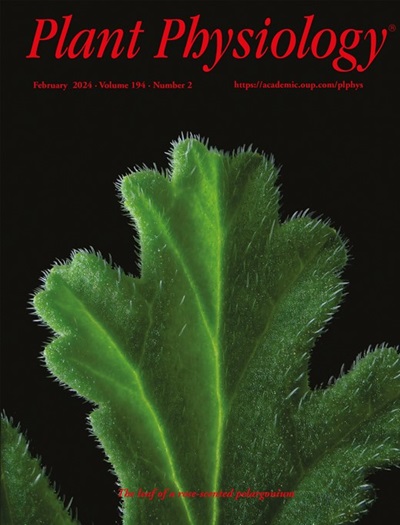Manipulation of the central autophagy component ZmATG8c affects thermotolerance in maize.
IF 6.9
1区 生物学
Q1 PLANT SCIENCES
引用次数: 0
Abstract
Rising global temperatures present a substantial threat to crop production. Autophagy is an important catabolic process that promotes plant survival under stress, and AuTophaGy-related 8 (ATG8) proteins play key roles in plant autophagy, although the contributions of specific ATG8 isoforms to heat tolerance remain to be clarified. Here, we demonstrate that heat-induced expression of ZmATG8c promotes maize (Zea mays L.) thermotolerance during both vegetative and reproductive growth stages. ZmATG8c-knockout mutants showed lower seedling survival and grain yield under heat stress, whereas plants overexpressing ZmATG8c exhibited enhanced seedling survival and improved yield, which were attributable to greater autophagosome production, elevated levels of ATG8, and reduced accumulation of ubiquitinated protein aggregates. We also found that the heat-induced bZIP transcription factor ZmGBF1 could bind directly to the promoter of ZmATG8c and facilitate its expression. Maize gbf1 mutants showed significant inhibition of ZmATG8c thermal induction and increased sensitivity to heat stress. Our findings demonstrate that ZmATG8c and ZmGBF1 have a role in mediating thermotolerance, providing promising targets for engineering maize with improved resilience to thermal stress.调控中心自噬组分ZmATG8c影响玉米的耐热性。
全球气温上升对农作物生产构成了重大威胁。自噬是促进植物在逆境下存活的重要分解代谢过程,自噬相关的8 (Autophagy -related 8, ATG8)蛋白在植物自噬中起着关键作用,尽管ATG8特异性异构体对耐热性的贡献尚不清楚。在这里,我们证明了ZmATG8c的热诱导表达促进了玉米(Zea mays L.)在营养和生殖生长阶段的耐热性。ZmATG8c基因敲除突变体在高温胁迫下幼苗存活率和产量降低,而过表达ZmATG8c的植株幼苗存活率和产量提高,这可能是由于自噬体产量增加、ATG8水平升高和泛素化蛋白聚集体积累减少所致。我们还发现热诱导的bZIP转录因子ZmGBF1可以直接结合到ZmATG8c的启动子上,促进其表达。玉米gbf1突变体对ZmATG8c的热诱导有明显的抑制作用,对热胁迫的敏感性增加。我们的研究结果表明,ZmATG8c和ZmGBF1在介导耐热性中发挥作用,为工程玉米提供了有希望的靶点,以提高对热胁迫的恢复能力。
本文章由计算机程序翻译,如有差异,请以英文原文为准。
求助全文
约1分钟内获得全文
求助全文
来源期刊

Plant Physiology
生物-植物科学
CiteScore
12.20
自引率
5.40%
发文量
535
审稿时长
2.3 months
期刊介绍:
Plant Physiology® is a distinguished and highly respected journal with a rich history dating back to its establishment in 1926. It stands as a leading international publication in the field of plant biology, covering a comprehensive range of topics from the molecular and structural aspects of plant life to systems biology and ecophysiology. Recognized as the most highly cited journal in plant sciences, Plant Physiology® is a testament to its commitment to excellence and the dissemination of groundbreaking research.
As the official publication of the American Society of Plant Biologists, Plant Physiology® upholds rigorous peer-review standards, ensuring that the scientific community receives the highest quality research. The journal releases 12 issues annually, providing a steady stream of new findings and insights to its readership.
 求助内容:
求助内容: 应助结果提醒方式:
应助结果提醒方式:


